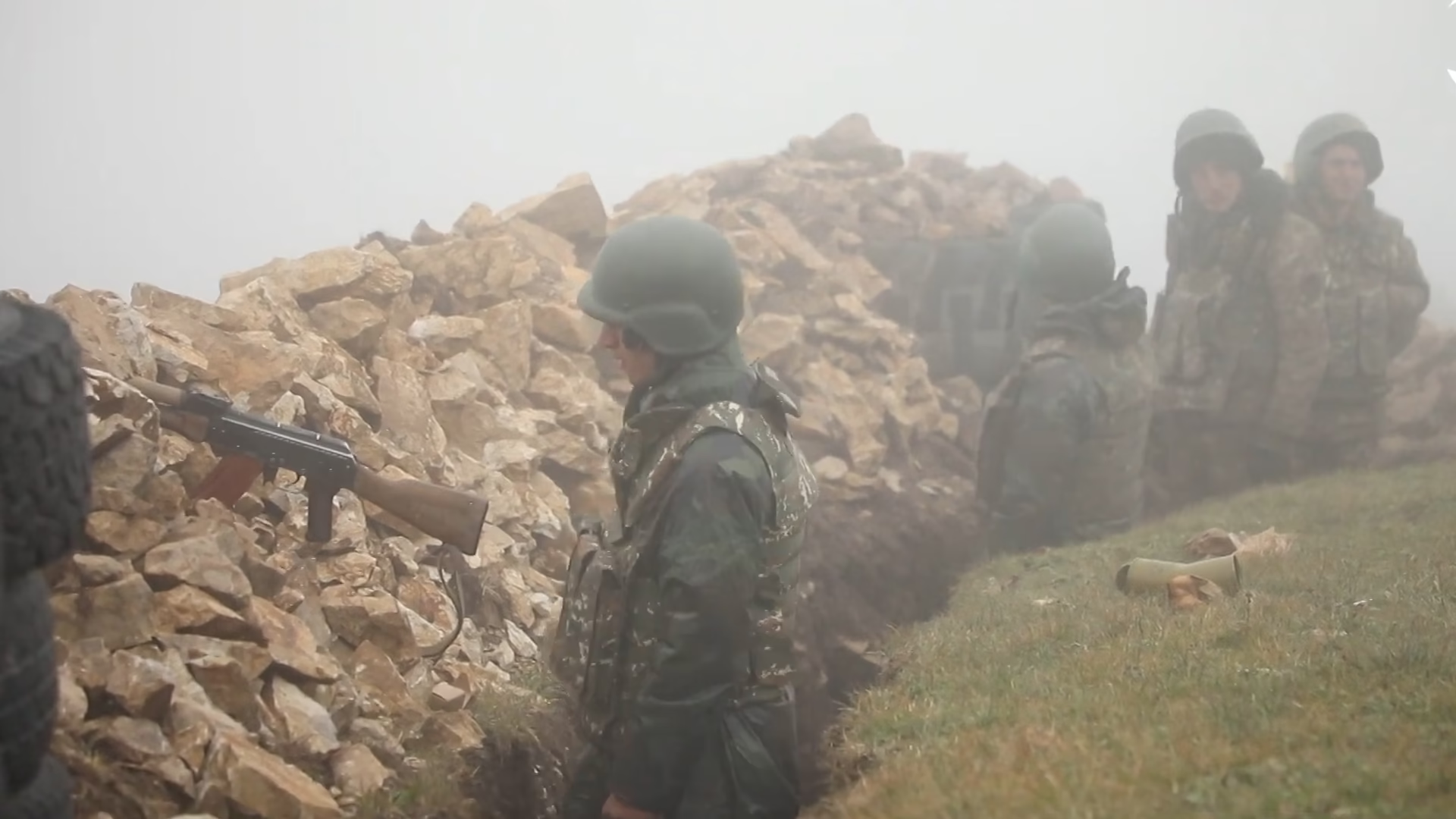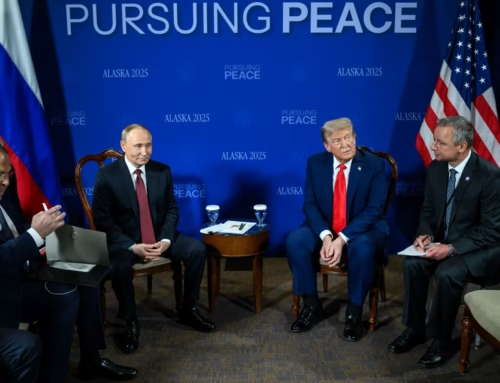Armenia-Azerbaijan conflict
Autor foto: Domena publiczna



Armenia-Azerbaijan conflict
Autor foto: Domena publiczna
New chapter in Armenia-Azerbaijan conflict
Autor: Witold Repetowicz
Opublikowano: 19 kwietnia, 2023
Azerbaijan’s pressure on Armenia – Karabakh blockade
During the last summit of the Organization of Turkic States held in Ankara on 16th of March 2023, president of Azerbaijan Ilham Aliyev addressed Armenia with a demand that the so-called “Western Azerbaijanis” must be guaranteed a safe return as a condition for the safety and rights of Karabakh Armenian population, on a basis of alleged reciprocity. This statement was accompanied with a deceptive version of history according to which Soviets were responsible for the division of “Turkic world” by granting Armenia the Zangezor region in 1920, which Aliyev called “our historical lands”. This is contrary to facts, as in 1921 the Bolsheviks made a deal with Ataturk, which granted the new Turkish state most of Armenian territory and stated that Zangezor, together with Nakhichevan and Karabakh became part of Soviet Azerbaijan. Only the fierce resistance of the troops of Armenian general Garegin Nzhdeh, made the Bolsheviks change their decision and agree to leave Zangezor in Soviet Armenia. Additionally Aliyev accused Armenia of committing ethnic cleansings in 1991 and then destroying Azerbaijan’s cultural heritage. In fact it was Soviet Azerbaijan under the rule of Aliyev’s father Haidar that committed the worst “cultural genocide” in Nakhichevan, removing any traces of Armenians there and getting rid of the entire Armenian population. Armenians were also brutally expelled from Baku and many other places under Azerbaijan’s control.
At the same time a group of Azeris, claiming to be ecological activists, is continuing the blockade of the Lachin corridor, which is the only road connecting Armenia with Nagorno Karabakh and Azerbaijan, ignoring the interim measure applied by International Court of Justice ordering Azerbaijan to „take all measures at its disposal to ensure unimpeded movement of persons, vehicles and cargo along the Lachin corridor in both directions”. Similarly ignored is the interim measure applied by the European Court of Human Rights ordering Azerbaijan to immediately reopen the Lachin corridor. The blockade was launched on 12th of December under the pretext of alleged ecological damage caused by mining in the territory controlled by Armenian authorities of the Republic of Artsakh (Nagorno-Karabakh). The self-proclaimed Azerbaijani ecologists are in fact government employees, including soldiers and policemen, who have no record of any previous non-governmental activity. According to real Azerbaijani opposition activists, this action’s goal, besides exerting pressure on Armenians, is to pretend that in authoritarian Azerbaijan there is a place for independent activism, which is completely not true. The blockade caused a humanitarian catastrophe for 120 thousand Armenians living in Karabakh, as shortages of food, medicines and electricity are widespread. It also prevented some 1100 Karabakh residents, including 270 children, from coming back to their homes after visiting Armenia. During the blockade, several times the vital infrastructure for Karabakh, including for gas, internet and electricity supply, was damaged or temporarily cut off, causing additional suffering of the residents of the region. Notably, Russian soldiers, so called “peace-keepers” or “mirotvorcy”, who control the road and Karabakh, according to the ceasefire deal of 10th of November 2020, have remained inactive against this blockade.
Syunik issue
These developments come at the time of intensive diplomatic efforts to find a peaceful solution to the Armenia-Azerbaijan dispute. Armenian assistance to Turkey after the disastrous earthquake and the visit of Armenian Minister of Foreign Affairs Ararat Mirzoyan to Turkey on 15 February 2023 were particularly hopeful signs given the strong influence Turkey has on Azerbaijan. But there were also much less optimistic developments and the situation is much more complex. Contrary to popular belief, the Karabakh issue is not anymore the sole problem in Armenia-Azerbaijan’s dispute with Russia not being a supporter of Armenia, who has reasonable doubts about the reliability of Russian and Collective Security Treaty Organization (CSTO) mutual guarantees of military support in case of aggression. This question does not concern Karabakh, which is not covered by these obligations, but the Syunik province (called Zangezor by Azerbaijan) that is internationally recognised Armenian territory and has formidable geopolitical significance. There are yet more actors at play. Iran, whose relations with Azerbaijan deteriorated in recent months, allegedly gave Armenia its own guarantees of military assistance if Azerbaijan attacks Syunik and started to muster its forces near Azerbaijan’s border. On other hand, Azerbaijan intensifies its cooperation with Israel, whose archfoe is Iran. This makes the prospect of a war on Syunik very dangerous as it can easily transform into a regional conflict or at least a proxy war that would engage the West rather than Russia. CSTO unreliability is already obvious so it would not be the main issue in the case of such conflict. Much more important is the prospect of an armed conflict (direct or proxy) between Iran on one side and Turkey and Israel on the other. Turkish membership in NATO and special relations between Israel and the USA can drag the West into such a war. This would be even more problematic given the role of the Armenian diaspora in many Western countries, including USA, France and also Poland. It shouldn’t be also forgotten that Armenia is a democracy and Azerbaijan is a dynastic autocracy with one of the most repressive regimes in the world (according to Freedom House and other such institutions).
Geopolitical significance of Syunik province is that it gives Armenia connection to Iran and at the same time it separates Turkey and Nakhichevan from Azerbaijan and other members of Organization of Turkic States (in other words it divides the panturkic geopolitical project). For Armenia it has existential consequences as its only neighbour other than Iran with whom it’s border is open is Georgia (other 2 neighbours are Azerbaijan and Turkey). However, Armenia-Georgia relations are at best correct and not very warm. Both Turkey and Russia can also exert its pressure on Georgia, which could have been seen both during “44 days war” in Karabakh and now during the war in Ukraine. This could be changed if the EU and US sponsor a strategic alliance between these 2 lonely democracies in this region. In the longer perspective it may enable the creation of an alternative transit route from Central Europe across Black Sea and Georgia-Armenia corridor to gas and oil rich Iran (and also Iraq) and further to India and the Indo-Pacific region. Even if this doesn’t fit to present geopolitical conditions (especially because of the policy of sanctions against Iran), it is necessary to think strategically about such alternatives to the trans-Anatolian transit route.
Iran-Azerbaijan escalation and Israeli factor
For Iran the separation from Armenia as a result of Syunik annexation by Azerbaijan, would mean a disastrous change of its geopolitical position against Turkey and its Turkic allies. In this context it is worth noting the harsh deterioration of Iran-Azerbaijan relations after the 27th January terrorist attack on Azerbaijan’s embassy in Tehran. After this incident Azerbaijan evacuated its entire embassy and Aliyev accused the “Iranian establishment” of orchestrating the attack. Statements containing more or less open territorial claims to West Azerbaijan and East Azerbaijan provinces in Iran are increasingly frequent in Azerbaijan. It is worth explaining that the territories north of Aras river (Iran-Azerbaijan border) adopted the name “Azerbaijan” only at the beginning of 20th century and earlier its inhabitants were called “Caucasian Tatars”. This was an initiative of panturkic circles who wanted in this way to establish a basis for territorial claims against Iran. When the Soviets took control over the Southern Caucasus they followed this pattern.
In late January Azerbaijan arrested dozens of people for alleged spying for its southern neighbour and spreading Iranian propaganda. Both sides intensified exchanging accusations and spreading disinformation against each other. Azerbaijan also intensified its contacts with Israel and in late March 2023 opened its embassy in Jerusalem (not like most countries in Tel Aviv). After Israeli statements that both countries have the same perception of Iran as a threat, Iran accused Azerbaijan of making an anti-Iranian alliance with Israel and turning its territory into a national security threat for Iran. Baku, in its turn, fiercely responded that Iran has no right to intimidate Azerbaijan. It is also worth mentioning that Israel provided Azerbaijan with significant assistance during the “44 day” war in Karabakh against Armenia. This was not because Israel has any problem with Armenia but rather it was a payment to Azerbaijan for forming an alliance against Iran. Azerbaijan is the only of Iran’s neighbours that is ready for security cooperation with Israel against Iran but it has its price. On the other hand, in October 2022 Iran opened its consulate in Syunik and warned that it considers any changes of the borders in the region as a “red line”. In its turn Azerbaijan made establishing an extraterritorial corridor through Syunik a condition for peaceful conclusion of its dispute with Armenia over Karabakh. Armenian prime minister Nikol Pashinyan strongly rejected it and also defined this issue as a “red line” which is understandable as it would in fact separate Armenia from Iran and lead to losing control over Syunik. Now Azerbaijan must use a road through Iran as a land connection with Nakhichevan, which gives Iran leverage against its neighbour. However, this route is becoming problematic in the context of deterioration of the relations between the two countries. The alternative is a very long way through Georgia and Turkey, around all Armenian territory.
Western Azerbaijan issue – mounting pressure or attempt to annihilate Armenia
Raising the issue of “Western Azerbaijan” is an even further escalation of Azerbaijani demands. The concept of “Western Azerbaijan” puts in question the legitimacy of Armenian statehood, as in the narrative of promoters of this concept it consists of three parts: Zangezur, Goyca (Lake Sevan region) and Irevan (Yerevan). Importantly, Aliyev family originally comes from a village in Syunik from where they had moved to Nakhichevan in the early XX century, before Heydar Aliyev, father of Ilham and his predecessor as president of Azerbaijan, was born. Aliyev now demands that Azerbaijanis who claim to be of “Western Azerbaijan” origin should have the right for compensation for their lost property and Armenia must guarantee their safe return. He also equates this issue with the issue of guarantees of safety for the Armenian population in Karabakh, which is absurd and in no way acceptable for Armenia. Aliyev’s demand ignores the plight of Armenians massacred and expelled from Azerbaijan’s territory, including Baku and Nakhichevan (where yet in the early XX century they constituted 40% of the population and now there is not a single Armenian left). Aliyev is also aware that Armenians, even if allowed to, would not return to Azerbaijan controlled territories as this state is well known for violating human rights even of ethnic Azerbaijanis, not to mention any minorities. Democratic world is looking the other way because of Azerbaijan’s gas and oil. As Armenia is democratic, even if it is not a perfect democracy, it would be under spotlight in case of any violations of the rights of Azerbaijani population if they are allowed to return. However, the key issue in this context is the population disproportionality. Azerbaijan, with its more than 10 mln of population can colonize Syunik which has a population of about 150 thousand or even try to demographically dominate all of Armenia.
It can not be excluded that the aim of Azerbaijan is to put an end to Armenian’s statehood, however it is also possible that raising the bar is a tactic to compel Armenia to withdraw from its key demands. It pertains particularly to Armenian demand to introduce international peace forces to Karabakh as a guarantee of safety and rights of the Armenian population there after transferring this region under Azerbaijan’s administration. Without such international control it is clear that Armenians would not stay there and after escaping to Armenia proper they would overthrow Pashinyan as a “traitor”. Such a coup would be instigated by Russia and would lead to the reinforcement of Russian control over Armenia. Given good relations Russia has with Iran, Turkey and Azerbaijan, despite its weakening caused by the Ukrainian war, it can offer to play a role of mediator between Iran and Azerbaijan, proposing a joined, Russian-Iranian (and maybe yet Turkish) control over Syunik, that would be officially still part of Armenia. Notably Russia, like Azerbaijan (however because of different reasons) vehemently opposes introducing international peace forces to the region.
Conclusions:
1.It is absolutely necessary to mount diplomatic pressure on Azerbaijan to cease linking normalisation with Armenia and of the future status of Nagorno-Karabakh to the Syunik issue. It should be clear that any curtailment of Armenian sovereignty over Syunik, including any kind of exterritorial corridor, is completely unacceptable and constitutes a red line for the European Union.
2. Azerbaijan should be warned that any attempt to change internationally recognised borders will be met with harsh reaction from the EU. Particularly, it should be clear that invasion on Syunik would mean sanctions and isolation and providing Armenia with assistance (military equipment).
3.Russian soldiers in Nagorno-Karabakh should be replaced with an EU military mission, which should be also deployed in Syunik. It is necessary to pressure Azerbaijan to accept such a solution as a condition of introducing its administration in Karabakh. It would also enable Armenia to leave CSTO and expel Russian forces from its territory.
4.The EU should also exert pressure on Azerbaijan to cease its blockade of Karabakh. It should be clear that it is unacceptable and continuing it will be met with sanctions.
5.Diplomatic work and NGOs’ projects on Georgia-Armenia rapprochement are vital for enhancing democracy in the South Caucasus region.
6.Diplomatic pressure should be also exerted on other countries with the aim not to transform Syunik into a scene of a regional proxy conflict.
7.Azerbaijan’s narrative on Syunik and “Western Azerbaijan” and it’s demands on extraterritorial corridor through Syunik constitutes a threat for regional stability and may lead to a regional conflict;
8. Blockade of Karabakh has nothing to do with ecology and is an act of hybrid warfare leading to a humanitarian catastrophe;
9. Armenia and Georgia are the only democracies in the region and this can’t be overlooked for sake of temporary interests, democracies should be strengthened and preserved.
Author: dr Witold Repetowicz, Research Fellow, Casimir Pulaski Foundation






